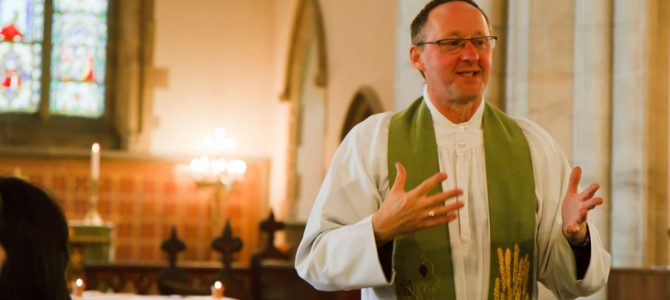
October was chock full of political drama, so I can understand how you might have missed that it was also Pastor Appreciation Month. Republic death throes notwithstanding, our church surprised each of our elders and pastors with as much appreciation as we tired voters could muster.
Because all anyone can talk about is sexism, I am happy to report there was not a woman among those elders. Not one.
I am an enthusiastic supporter of male-only elders—those responsible for leading the church, preaching, overseeing the care of their members, and protecting the congregation from bad doctrine. Is it because I think that women are incapable of leadership? Well, I know one woman who is.
Do I support male-only pastors and elders because I think women lack intelligence, organization, or the capacity for biblical knowledge? The Apostle Paul would respond to such nonsense with a hearty “Meh genoito!” or, as the kids these days would text, “ohn.” I know plenty of women who are incredible leaders and gifted speakers who can expound, exegete, and exhort as well as Keller or Piper, Pratt or Chan. But I don’t believe those gifted women should be lead pastors of the local church.
Today many denominations are falling all over themselves to fit into the current progressive mold and declare that the Bible celebrates female pastors. They do so under the mistaken assumption that for men and women to have equal value, they must have equal roles, and they eisegete scripture accordingly. This pedestrian interpretation of equality misses the whole concept of the Godhead in which Father, Son, and Holy Spirit each have distinct roles and responsibilities, yet are all equally God and worthy of worship.
If a church is going to use such creative license with biblical truth, they might as well ignore other uncomfortable scriptures. Indeed, many churches who ordain women find it’s a gateway for compromise on a host of other morally demanding doctrines. While I believe the most biblical position prohibits women as elders and pastors, here I’ll try to outline a more pragmatic argument.
Human Formation Is the Job of Marriage and the Church
To be clear, neither I nor the Bible have an issue with a woman’s leadership in business, academia, or government. I would have given the vacation homes of my Democrat friends to cast my vote for the Cruz/Fiorina ticket.
That’s because government and other civic establishments are not responsible for creating and maturing people. That responsibility falls to two institutions: the family and the church. I don’t care if the entire government is run exclusively by women. As long as they have the right ideas, I’m down. Human development, however, in both the physical and spiritual realms, requires male and female participation.
The institution of marriage is life-creating and provides the stability and support needed to grow its youngest members into mature, responsible, independent citizens. Permanent dual-gender parenting stacks the deck in favor of a child’s successful launch into adulthood. Likewise, the institution of the church is responsible for growing spiritual infants to maturity. The church not only teaches believers to take responsibility for themselves, but also for the neediest among us. Churches with strong male participation are more successful in that mission.
Women naturally tend to be more involved players at home and at church. Men, on the other hand, often need persuasive external pressures to keep them connected to both. While women (especially wives) have a positive impact on men’s behavior, they cannot replace the distinctive impact men have on human development, especially for their sons.
That’s because men do not learn to be good men from following women, not even from women who speak truth. Men learn best how to take responsibility, be self-controlled, be protective of women, and channel their competitive and aggressive tendencies to positive outlets by watching other good men. Without strong male leadership, it’s difficult for boys to learn to be good men.
If there’s one thing our culture is starving for today, it is the return of men who take responsibility for themselves and their families and, by extension, their community. When we assess how the family and the church have suffered from the exodus of men, we can see the wisdom in the biblical prescription for male headship.
When You Make Men Optional, They Leave
The sexual revolution initiated the deconstruction of traditional male and female roles and communicated that women weren’t truly equal unless they were working full-time and unshackled by the burden of pregnancy. Our culture, which views “inequality” as the greatest evil, took those concepts and ran headlong toward diminishing any difference between men and women.
The gender ideology movement has brought those ideas to their logical conclusion: since there are no real distinctions between the sexes, a woman can “become” a man and vice versa. Especially when it comes to family life, we have sold the falsehood that men are optional, and we sealed that deal by legally redefining marriage as a genderless institution. All of this rubbish has sent men a powerful message: there is nothing unique about manhood and no place where men, and only men, are needed.
Unfortunately, marginalizing a man’s role in the home has had dire consequences for society. The Fatherless Generation summarizes: 63 percent of youth suicides, 90 percent of all homeless and runaway children, 85 percent of all children who show behavior disorders, 80 percent of rapists with anger problems, 71 percent of all high school dropouts, and 85 percent of all youths in prison come from fatherless homes. Fatherless children are four times more likely to live in poverty.
Our culture told men that they were unnecessary. To our detriment, men believed us. The sexual revolution was also the impetus for several denominations to begin ordaining women. Today, many liberal mainline Protestant churches are—quite literally—dying to prove how compatible Christianity is to the new definition of “equality.” They insist that only gifting and knowledge, not biological sex, matters for leadership.
I was invited to one such church a couple years ago. It was a congregation of the United Church of Christ, where “God is still speaking.” (Meaning, of course, is that God is telling the UCC leadership things he didn’t think Jesus and the apostles could handle.) This church replaced “Lord” with “Friend” in their hymns and the word “sin” was strangely absent from, well, everything. The congregation was run completely by women— women pastors, women on the board, and women doing maintenance. Not surprisingly, out of about 50 attendees, four were men. It seemed that when the denomination opened the ranks of leadership to women, men wanted very little to do with the church.
Hard data on the ratio of men to women in various denominations is sparse. We do know that overall men tend to be less involved in church life. On average, U.S. congregations draw an adult crowd that’s 61 percent female, 39 percent male. We can extrapolate that churches that allow for female pastors suffer a more significant gender imbalance in their membership. Among evangelical churches (where male-only leadership is more likely), 43 percent of members are men and, among mainline Protestant churches (where female pastors are more common), only 34 percent are men. In my congregation, the membership is 48 percent male.
Is your inner feminist writhing over the thought that male leaders are a key ingredient for institutional health in the family and church? The reality is that men are at their best when expectations are high. Men were made to accept hardship and sacrifice for others’ sake, which is pretty much a job description for both husband and pastor.
Male leadership in church results in more male involvement overall, which improves the church experience for everyone. One study found that “the presence of involved men was statistically correlated with church growth, health, and harmony… while a lack of male participation is strongly associated with congregational decline.” It is a gift to women when men pursue the moral, doctrinal, and relational excellence demanded of biblical leadership. Can I get an AMEN?
Strong Men ≠ Weak Women
As I watched each of our elders stand last Sunday, not once did I envy their office or feel that being excluded from the role of elder indicts my worth as a woman. Rather, I was filled with gratitude because I know what these men do week after week.
I have witnessed our elders stand against wrong with firmness and graciousness, while simultaneously being transparent about their own shortcomings. They visit the sick, pray for the dying, adopt the orphan, and care for the widow. Each leads weekly home groups teaching and investing time in a handful of members. These men see it as their responsibility to grow maturity in the men they shepherd. As a result, the husbands and fathers of our congregation are better protectors, providers, and servant-leaders of their families. Servant-leadership. The kind of leadership that makes you want to follow.
Lest you think that having a strong man at the helm of your home or church requires women to be weak, lemmetellyouwhat: there is not a doormat among the wives of our elders. These women, and so many others in our congregation, support the idea of headship in the home and church and are running businesses, ministries, and households. There’s even one soapboxy blogger trying to keep up with them.
These women are deeply involved in our churches’ ministries, the first to welcome outsiders, and have created a culture of such interdependence that no material need ever goes unmet. In other words? The result of having strong male leadership seems to, in my experience, cultivate confident, productive, and joyful wives.









